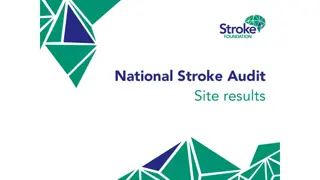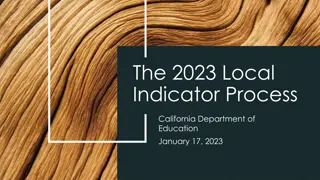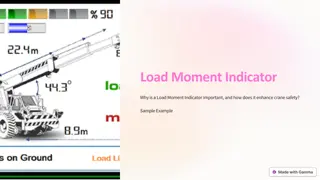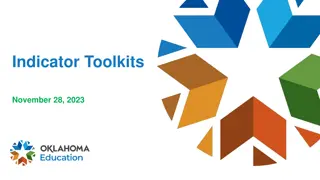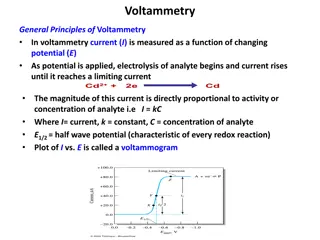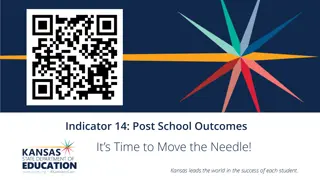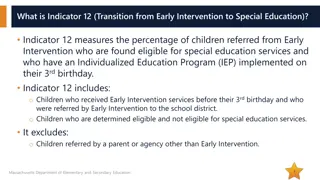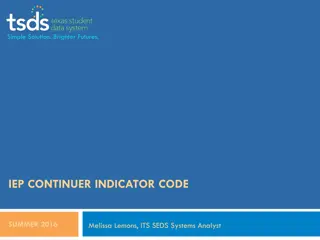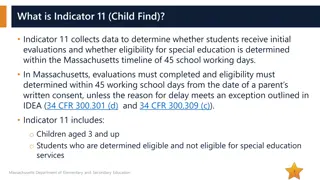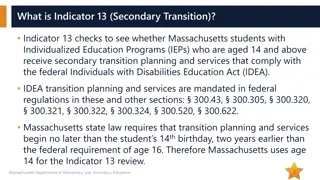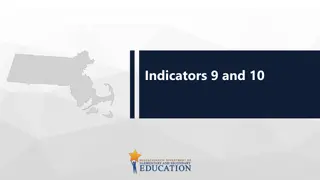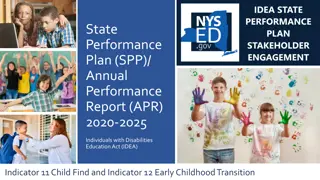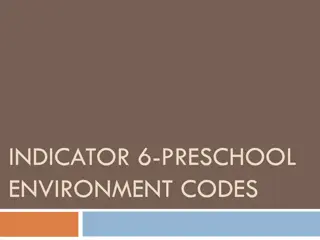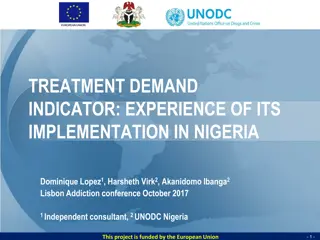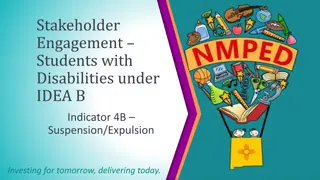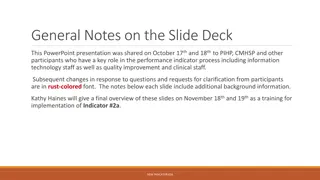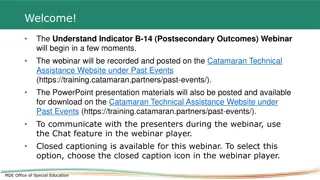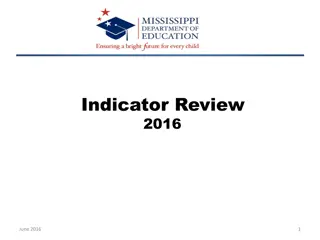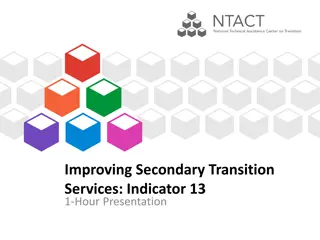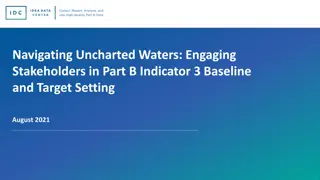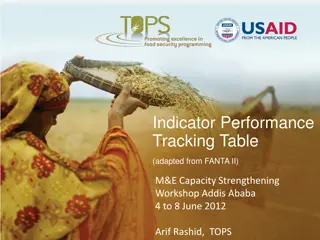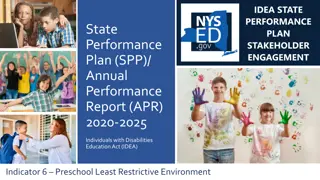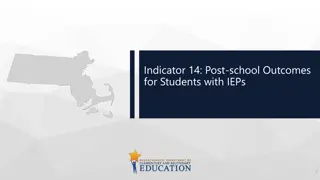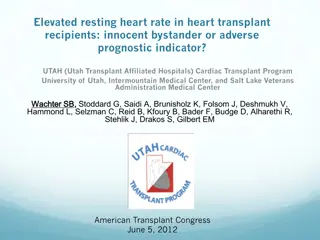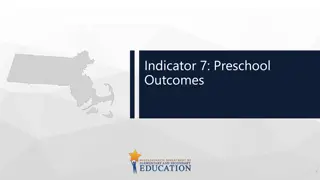SDG Indicator 6.5.1 Implementation & Monitoring 2023 Overview
Implementing Integrated Water Resources Management (IWRM) in the context of SDGs, with progress reports and stakeholder engagement. Access monitoring guides for SDG 6 Indicator 6.5.1. Discover the timeline for reporting in 2023, including stakeholder consultation processes. Participate in the SDG 6.
5 views • 38 slides
North America Panel Mount Indicator Lights Market
The North America Panel Mount Indicator Lights Market size is expected to reach USD 362.25 Million by 2033, at a CAGR of 5.6% during the forecast period 2023 to 2033. \n\n
0 views • 4 slides
S2 Science: Chemical Changes The pH Scale
Delve into the fascinating world of acids and bases with practical activities on the pH scale. Discover the properties of different substances, learn to measure and adjust pH levels, and explore the significance of pH in everyday life. From indicators to universal indicator colors, this educational
0 views • 31 slides
Lost Mary OS5000 Disposable Vape 5% Nicotine - $12.99
Lost Mary Disposable Device Lasting up to 5000 puffs, the device features a rechargeable USB Type-C port and even an LED battery life indicator. \/\/rb.gy\/ys6vnd
0 views • 7 slides
Post-School Outcomes Data Collection Updates for 2023
This information provides details on Indicator 14 data collection for post-school outcomes in 2023, focusing on assessing the success of educational efforts for students with IEPs one year after leaving high school. It covers the importance of Indicator 14, what it entails, changes for 2023 and beyo
3 views • 32 slides
National Stroke Audit Acute Services 2023 Hospital Data Slide Deck
Create an interactive slide deck using your hospital's data from the National Stroke Audit Acute Services 2023. Tailor the deck to suit your requirements by populating slides with your Framework and Clinical Care Indicator results. The deck is designed for sharing with your team and stakeholders. Ut
0 views • 15 slides
Understanding California's 2023 Local Indicator Process
Explore the 2023 Local Indicator Process by California Department of Education, including webinars, templates, purpose review, intended audience, accountability system, and the Local Control and Accountability Plan (LCAP) requirements for school districts, COEs, and charter schools to improve studen
1 views • 57 slides
Importance of Load Moment Indicator in Crane Safety
A Load Moment Indicator (LMI) is essential for crane safety as it monitors the load moment in real-time, helping to prevent overloading and potential accidents. By providing warnings and automatic shutdowns when safe limits are exceeded, the LMI ensures the crane operates within its capacity, enhanc
1 views • 5 slides
Understanding Louisiana's Interests and Opportunities Index
Louisiana's ESSA plan includes an Interests and Opportunities indicator to ensure schools offer a well-rounded education to students. This involves exposure to various learning areas and skill development. The state emphasizes the need for a fair, valid, and reliable measure that aligns with its val
1 views • 33 slides
Brain Mineral Deposition and Cognitive Decline Study
Investigating the progression pattern of brain mineral deposition as a differential indicator of cognitive decline in individuals with varying cognitive statuses from normal to Alzheimer's disease. The study aims to develop improved imaging techniques and specific cognitive-relevant atlases to under
4 views • 24 slides
Comprehensive Guide to Accessing and Utilizing Indicator Toolkits
This detailed guide covers various aspects of using Indicator Toolkits, including locating toolkits, completing required activities, uploading documentation, accessing dates to remember, and utilizing compliance monitoring dashboards. Learn how to efficiently navigate through the toolkits for compli
5 views • 26 slides
Understanding Voltammetry: Principles and Applications
In voltammetry, current is measured as a function of changing potential. The magnitude of current is directly proportional to the activity or concentration of the analyte. A voltammogram is plotted between current and potential, showing the characteristic half-wave potential. The process involves a
6 views • 76 slides
Quality Assurance Engineer's Journey Through Research and Optimization
Dive into the world of a Quality Assurance Engineer through research findings, optimization processes, and the assessment of composite materials' strength. Explore the role of thin indicator films, simulation modeling methods, and the application of Scikit-Learn. Discover the evolution of quality as
5 views • 10 slides
Understanding Hemoglobin Tests and Hematocrit in Blood Analysis
A hemoglobin test measures the amount of hemoglobin in the blood, which is essential for oxygen transportation in red blood cells. The test is crucial for diagnosing various health conditions, and visual methods are employed for analysis. Additionally, hematocrit, or red blood cell volume, is anothe
9 views • 23 slides
Energy Efficiency Indicators
Explore the latest findings from energy efficiency indicator studies in Norway and Finland, focusing on trends, drivers, and the role of these indicators in policy-making. Discover the challenges and opportunities presented by various energy efficiency metrics, along with recommendations for effecti
3 views • 20 slides
Improving Post-School Outcomes for Youth with Disabilities
In Kansas, transition services for students with disabilities have evolved over the years to focus on successful outcomes after high school. Indicator 14 measures the percentage of youth with IEPs who enroll in higher education or gain competitive employment within one year of leaving high school. T
1 views • 27 slides
KESA Monthly Update
The update covers the purpose of KESA, the State Board's action on KESA 2.0, requested approvals, and the development plans for the revised accreditation model. It highlights the focus areas, including fundamental practices, lead indicator data evaluation, compliance areas, and building KESA 2.0 for
0 views • 17 slides
Understanding Indicator 12: Transition from Early Intervention to Special Education
Indicator 12 measures the successful transition of children from Early Intervention to Special Education by evaluating the percentage of children referred from Early Intervention who are found eligible for special education services and have an Individualized Education Program (IEP) in place by thei
1 views • 6 slides
Texas Education Code Updates for IEP Continuer Indicator
Texas Senate Bill 1867, passed during the 84th legislative session, introduced modifications to exclude students who continue enrolling in high school after expected graduation from longitudinal rates calculation if they meet specified criteria. The updated IEP-Continuer Indicator Code for the 2016-
0 views • 6 slides
Importance of Indicator 11 in Special Education Evaluation Timelines
Indicator 11, part of Child Find, ensures timely evaluation for students eligible for special education services in Massachusetts. Compliance with the outlined timeline is crucial to prevent delays in receiving necessary support. Data collection, calculation, and resources are vital aspects of maint
0 views • 5 slides
Understanding Massachusetts Indicator 13 for Secondary Transition Planning
Indicator 13 in Massachusetts assesses the compliance of secondary transition planning and services for students with IEPs aged 14 and above, ensuring adherence to federal laws. The state collects data through file reviews to calculate a statewide compliance rate aiming for 100%. Compliance is measu
0 views • 5 slides
Analysis of Indicators 9 & 10 in Special Education Representation
The indicators 9 and 10 focus on the disproportionate representation of racial and ethnic groups in special education programs. Specifically, Indicator 9 looks at the overall disproportionate representation of groups eligible for special education, while Indicator 10 examines the disproportions with
1 views • 8 slides
State Performance Plan (SPP) & Annual Performance Report (APR) 2020-2025: Child Find and Early Childhood Transition Indicators under IDEA
This document discusses Indicator 11 (Child Find) and Indicator 12 (Early Childhood Transition) under the Individuals with Disabilities Education Act (IDEA) in the State Performance Plan (SPP) and Annual Performance Report (APR) for 2020-2025. It covers measurement methodologies, data trends in New
0 views • 30 slides
Building a Strong and Diverse Team Using Myers-Briggs Type Indicator (MBTI)
Shifting the audit paradigm by emphasizing the importance of building a balanced and diverse team. Hiring the right mix of individuals can lead to problem-solving, better connections, and utilizing individual strengths effectively. The Myers-Briggs Type Indicator (MBTI) is highlighted as a tool to u
0 views • 30 slides
Enhancing Mountain Resilience through SDG Indicator 15.4.2
Fabio Parisi, a dedicated member of the Mountain Partnership Secretariat at FAO, has been actively involved in developing and updating the Mountain Green Cover Index for SDG Indicator 15.4.2. His educational background in crisis and security management, along with a passion for volunteer work in ref
0 views • 7 slides
Understanding Indicator 6: Preschool Environment Codes
This information provides insights into Indicator 6, focusing on the percentage of children ages 3 through 5 with Individualized Education Programs (IEPs) attending regular early childhood programs versus separate special education classes. It delves into the definitions of regular early childhood p
0 views • 29 slides
Implementation of Treatment Demand Indicator in Nigeria
Experience of implementing the Treatment Demand Indicator (TDI) in Nigeria was discussed at the Lisbon Addiction Conference in October 2017. The Nigerian Epidemiological Network on Drug Use (NENDU) reported on patients entering treatment facilities, with cannabis being the main substance driving tre
0 views • 13 slides
Stakeholder Engagement for Students with Disabilities under IDEA B Indicator 4B
Meeting objectives include reviewing data for Indicator 4A on Suspension and Expulsion, stakeholder input, data analysis, target setting, evaluating progress, and improvement strategies. Housekeeping meeting norms ensure valuable input from all, with options for parents/guardians to provide feedback
0 views • 38 slides
Performance Indicator Process Overview for Implementation
This PowerPoint presentation, shared with key stakeholders, focuses on a new indicator (#2A) tracking the completion of biopsychosocial assessments within 14 days of a non-emergency service request. The data includes populations like MI adults, MI children, IDD adults, and IDD children. Medicaid eli
0 views • 31 slides
Understanding Postsecondary Outcomes - Indicator B-14 Webinar Overview
The Indicator B-14 webinar provides information on postsecondary outcomes for youth with IEPs, focusing on indicators like higher education enrollment and competitive employment within one year of leaving high school. The webinar covers survey procedures, response rates, and results from the Michiga
0 views • 51 slides
Education Performance Accountability Indicators Review
The Indicator Review for 2016 highlights the State Performance Plan (SPP) and Annual Performance Report (APR) outcomes for the school years up to 2014-2015. It covers indicators related to compliance, results, graduation rates, dropout rates, and assessments required for statewide performance evalua
0 views • 55 slides
Enhancing Secondary Transition Services: Key Strategies for Indicator 13 Implementation
Learn about the essential components of Indicator 13 in secondary transition services, including transition assessment, goal-setting, alignment of IEP goals, and coordination for successful student outcomes. Discover why transition assessment is crucial, how it informs the planning process, and the
0 views • 51 slides
Understanding Changes in Stakeholder Engagement for Indicator 3 Baseline and Target Setting
Explore the modifications in Part B State Performance Plan/Annual Performance Report (SPP/APR) Indicator 3 concerning children with IEPs on statewide assessments. Discover new requirements for stakeholder and parent engagement, gain insights into strategies for engaging stakeholders, and grasp the d
0 views • 30 slides
Stakeholder Engagement for Students with Disabilities under IDEA B Indicator 4B
Engage stakeholders to review data and provide input on Indicator 4A, focusing on suspension and expulsion of students with disabilities. Meeting objectives include analyzing data, setting targets, and evaluating progress to enhance strategies for improvement. Meeting norms emphasize inclusivity and
0 views • 30 slides
Understanding IPTT for Effective Program Monitoring and Reporting
The Indicator Performance Tracking Table (IPTT) is a crucial tool for tracking performance indicators in food aid programs. It helps in linking objectives with baseline and target values, aiding in reporting, program improvement, and storytelling. This tool is utilized to fulfill reporting requireme
0 views • 24 slides
Preschool Least Restrictive Environment: Indicator 6 under IDEA
The State Performance Plan (SPP) and Annual Performance Report (APR) for 2020-2025 focus on Indicator 6 of the Individuals with Disabilities Education Act (IDEA) concerning Preschool Least Restrictive Environment. This plan evaluates state efforts to implement IDEA requirements and improve their imp
0 views • 57 slides
Understanding Indicator 14: Post-School Outcomes for Students with IEPs
Indicator 14 is a crucial measure used to assess the post-school outcomes of students with IEPs one year after they leave high school. It focuses on whether these students are enrolled in higher education, competitively employed, or engaged in other postsecondary education or training programs. Mass
0 views • 8 slides
Elevated Resting Heart Rate in Heart Transplant Recipients: A Prognostic Indicator?
Elevated resting heart rate is being investigated as a potential adverse prognostic indicator in heart transplant recipients. This study aims to determine if sustained tachycardia increases the risk of all-cause mortality and cardiac allograft vasculopathy in these patients through a retrospective a
0 views • 21 slides
Understanding Preschool Outcomes: Indicator 7 Insights
Explore Indicator 7 focusing on preschool children with IEPs and their improvements in social-emotional skills, knowledge acquisition, and appropriate behaviors. Learn why Indicator 7 is crucial for development and learning, see data measurements, targets for upcoming years, and access additional va
0 views • 7 slides
Practical Guidance on Localizing Indicators in Cocoa Supplier Training
This training session focuses on providing practical guidance for localizing indicators in the context of cocoa supply chains to address forced labor issues. Participants will learn how to adapt indicators to specific local contexts, develop relevant indicator lists, and create monitoring questions
0 views • 11 slides





